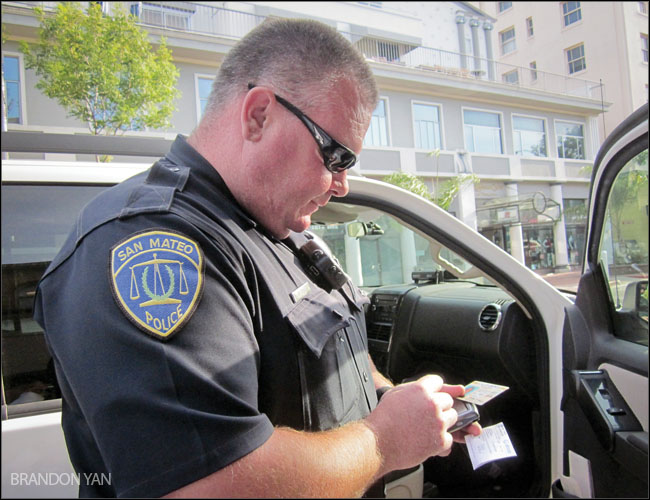
How do people view the job of law enforcement?
Dean of Students Michael Valmonte says, “To protect and serve.”
“Prevent people from committing crimes,” says sophomore Matt Lanthier.
Officer Brendan Boyle of the San Mateo Police Department provides an inside perspective into the life of a police officer.
“We’re here to do the best we can to help protect life and property, investigate criminal activity, and respond to emergencies,” says Boyle.
Some students believe an officer’s average day is characterized by boredom.
“I think they kind of just look for something to do to pass the time,” says sophomore Quinn Bredl, “because I can’t imagine that it would be too fun just hanging out in a car doing nothing for eight hours.”
Lanthier says, “I’d imagine it’d be pretty boring on uneventful days, but when something bad happens, I assume it’s pretty exciting.”
However, police officers offer their own perspective on the validity of these perceptions.
Officer Craig Collom of the San Mateo Police Department says, “It’s enjoyable, busy. It’s different every day. We get bad people off the streets [and] catch violators.”
“If a call for service comes out, you get dispatched over the radio, and if you’re not dealing with a call or conducting a follow-up investigation on a previous call, you’re expected to be out doing traffic enforcement and proactive crime prevention,” says Boyle. “For every boring afternoon, there’s plenty of times when the hot call comes out and there’s plenty of excitement.”
Despite the different views of an officer’s work day, most agree on one aspect of the job.
“It’s a difficult job. Their lives are in danger,” says sophomore Alison Clark.
Affirming this belief, Boyle says, “There are certain parts about this job that are dangerous. The physicality of this job – that’s just part of it, and there are inherent dangers.”
Students reveal some of the public’s negative perceptions of police.
“The general public, I think, views police [as] not really good or bad but more as robots just doing their jobs,” says Bredl.
Junior Kurtis Young says, “[They] cause unnecessary trouble and like to make other people suffer.”
Responding to such views, Boyle says, “There’s always going to be people that feel that the police aren’t there to help them – they’re there to hold them down, harass them or whatever. It doesn’t mean that we’re not going to do everything we can to help them out. It just means that we’re going to agree to disagree.”
Conversely, many others view the law enforcement in a positive light.
Clark says, “It keeps people doing the right thing because they know [police] are out there.”
Bringing light to police interactions at Aragon, Valmonte says, “I think the San Mateo police have been very good. They’ve been very supportive of the school. I think the police have treated our kids very fairly up here.”
Different reasons contribute to these perceptions, but one is the media portrayal of police.
Sophomore William Rivera says, “Popular artists endorsing this ‘f*** the police’ movement influence their large [base] of fans… That impacts people’s perception of cops.”
This movement is influenced in part by the song “F*** tha Police” by N.W.A, which expresses in its lyrics such angers as, “F***in with me cuz I’m a teenager” and “Thinkin every n**** is sellin narcotics.”
Citing historical events, some find merit to these anti-police movements.
In response to the death of Oscar Grant by Bart police, protest organizer Rachel Jackson says, “The anger in the community is understandable…the system does not work and to the extent that it does, there are two systems of justice – one for low-income people and people of color, and another for police and people of means.”
On the flip side, “The media,” says Bredl, “tries to have the public perceive police as very diligent and hardworking.”
Another reason for the difference in opinion lies in the character of each individual.
“Students that are involved in risky behavior are going to be paranoid over police,” says Valmonte. “Kids who are not, are going to welcome the police.”
While public perception of law enforcement differs from individual to individual, at the end of the day, police officers have only positive things to say of their career.
Boyle says, “It’s a great feeling when you can call that lady back saying, ‘That guy that hit you and took off and destroyed your car and injured you and decided it wasn’t worth sticking around and being responsible, I just booked him into county jail.’ It’s a very rewarding job.”





